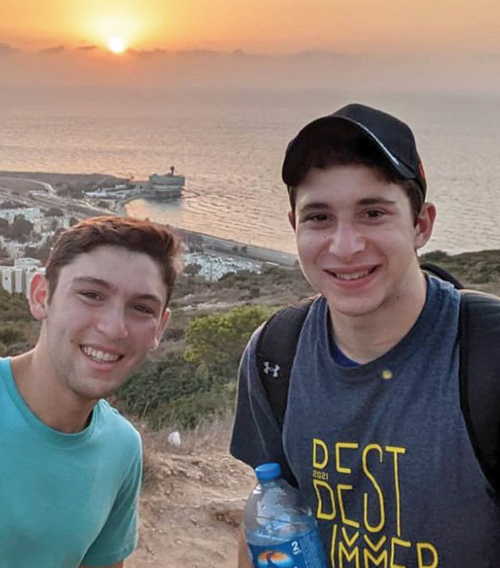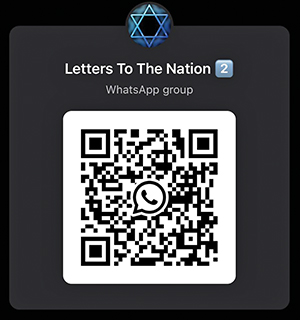
Noam Schechter, an MTA graduate, and Dovid Shinensky, a Yeshiva of Greater Washington graduate, are studying in Yeshivat Kerem B’Yavneh for shana bet. When the Iron Swords war broke out, they wanted to do something that would make a difference. Along with volunteering and increasing their learning hours, they started a letter-writing project called “Letters to the Nation.”
On October 7, Noam and Dovid were at a hotel near Beit Shemesh for the chag along with the chief rabbi of Ukraine, Rabbi Yaakov Dov Bleich, and several new olim from Ukraine whom he and his wife had helped through their conversion or teshuva process. The rabbi had wanted the olim to have a meaningful and uplifting chag, so he invited several yeshiva boys to join them.
On Shemini Atzeret morning they heard the rockets overhead, but their area had no siren. A few of the waiters were called to Miluim and reported some of the news to the guests. By the second day of chag, most of the guests had gone home and no one was planning to come for Hakafot Shniyot.
Rabbi Dani Zuckerman, one of the rebbeim from Yeshivat Keren B’Yavneh, initially suggested that the yeshiva boys write letters to a family to whom their mashgiach, Rabbi Davidson, was going to pay a shiva call, and the project grew from there.
They started their project because they understood how hard it must be for Jews outside of Israel to be away from Israel during a time of war. While many can and do send money, they might want to do something more personal. Through Noam and Dovid, people from all over the world can send letters to families who have lost loved ones, both civilians and soldiers, in this war. They decided to use WhatsApp to reach English-speaking Jews in the Diaspora. In only a few weeks, they have over 1,200 members of their groups.
The invitation to their WhatsApp group says it all:
“As a nation, we grieve together. Despite the physical distance that separates us, we can offer support to those now in grief by writing letters. Basic bios of those killed will be posted daily on this chat. Even simple letters like, ‘I’m X from Y, and you’re in my thoughts,’ are extremely meaningful, but more will be appreciated as well. These messages will be printed out and personally delivered to grieving families, showing global Jewish solidarity during this challenging time. Together, we extend our love and support, bridging the physical gaps that separate Am Yisrael.”
How does the letter-writing project work?
Every day, Noam and Dovid research the people who were killed and post short bios on the WhatsApp groups. They include information such as their name, age, gender, who is mourning, where they lived, whether they died as a soldier or a civilian, if they were fighting back or simply enjoying the music festival. This helps writers personalize the letters.
The first family to receive letters from Noam and Dovid lives in Kvutzat Yavne, adjacent to the yeshiva. The two went with a stack of 100 letters from fellow Jews all over the world—the U.S., England, Australia, South Africa, Norway, Belgium, Switzerland and other countries. These letters conveyed that there are Jews thousands of miles away who are mourning right along with the family.
 Noam and Dovid sensed that the letters had a tremendous impact. The mother’s reaction was palpable because of the sheer volume. It didn’t even really matter if the letter was short or long. “Am Yisrael is with you” was the message.
Noam and Dovid sensed that the letters had a tremendous impact. The mother’s reaction was palpable because of the sheer volume. It didn’t even really matter if the letter was short or long. “Am Yisrael is with you” was the message.
The second delivery was to Ashdod, where they delivered letters to three grieving families. Noam and Dovid had originally planned to deliver to 10 families that day, but each of the first three families asked them to stay for a long time, which shows how meaningful this project is.
They currently have 180 names and have published about half of their bios in the chats.
Noam and Dovid would like to acknowledge Rabbi Elliot Schrier from Bnai Yeshurun, who got the link out originally. They also are grateful to Rabbi Neil Zuckerman, who works with the Orthodox Union to encourage shuls to take on the name of one of the victims, learn in their memory, and write letters or a communal letter to their family.
To join the WhatsApp group, please scan the QR code found within this article.









